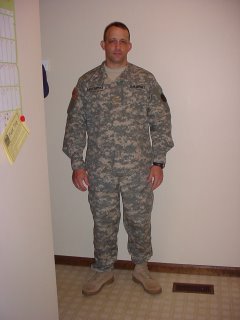Read till you get to the bottom and you'll see why this is here.
Ft. Stewart's 3rd Infantry Division returns to Iraq
By MIKE WILLIAMS
Cox News Service
Thursday, February 17, 2005
TIKRIT, Iraq — Less than two years ago, Staff Sgt. Antonio Presley was riding as a gunner in a tank, part of the U.S. Army's 3rd Infantry Division from Ft. Stewart, Ga. that captured Baghdad International Airport and helped bring down Iraqi dictator Saddam Hussein.
Now Presley and his unit, Charley Company, 2nd Brigade, 7th Infantry Regiment, are back in Iraq for their second tour of duty, hoping to finish the job they started by helping Iraqis rebuild the country with a stable, democratic government.
"Some of the guys were jumpy when we first rode in this time, but now we've got it down," said Presley, 25, a native of Atlanta. "I wasn't disappointed when I heard we were coming back. It's the cause. That's what I signed up for."
The 3rd Infantry Division is the first major American military unit sent back to Iraq for a second time since the March 2003 invasion. Some 19,000 soldiers of the division were being sent to Iraq in phases in January and this month.
The second deployment, expected to last 12-14 months, has been hard on the soldiers and their families.
"It's harder on our families than on us," said Staff Sgt. Harold English, 34, of Harrisburg, Pa., who is now deployed to Iraq for the third time after having taken part in Operation Desert Storm more than a decade ago and the 2003 invasion. "They hear the reports and don't know what's going on."
While the division's mission this time is essentially peace-keeping and nation building, there is no question that the job is still dangerous.
The unit suffered its first casualties less than a week after arriving in Iraq when a roadside bomb blew up a vehicle on Feb. 4 in the town of Bayji, just north of Tikrit. Staff Sgt. Steven G. Bayow, 42, of Micronesia and Sgt. Daniel Torres, 23, from Ft. Worth, Texas, both veterans of the 2003 invasion, were killed.
"As you can expect, that was hard on the unit," said Maj. Mark Nordstrom, 49, the 1st Brigade chaplain. "These were their friends, their roommates, and they had worked together for four years."
Word of the casualties spread quickly, shocking some soldiers and reinforcing the dangers they face.
"For guys who haven't been here before, it was a reality check," said Staff Sgt. Anthony Lewis, 25, from Fresno, Calif. "It made them aware of what we're doing out here, that you never know when or how something might happen. It's important to be ready all the time."
Despite the ever-present threat of insurgent attack, most of the soldiers feel Iraq is a far different place than during the 2003 invasion.
"Last time we were here, this patch was feared," said Capt. Jason Freidt, 30, Charley Company's commander, pointing to the division emblem on his shoulder. "Now it's welcome. There are a lot of former Iraqi military officers living in one of our towns, and some of them told us they fought against us last time near the Baghdad airport. Now they're cooperating with us."
Freidt's company has been assigned to patrol territory just south of Tikrit that includes farmland and two small towns, Wynot and Owja, the village where Saddam grew up.
Their job is to provide security in the area, to find and arrest insurgents and to help the Iraqis rebuild their government, economy and institutions. The unit is taking over for a company from the 1st Infantry Division which laid the groundwork by organizing elections for city councils in both towns — the first time either had a local government, much less one democratically-elected.
Friedt and his men will continue encouraging local leaders to build up their town's government, schools and other public services and facilities. The unit has money available to lend to local business owners, as well as for projects like rebuilding schools, parks and water systems.
"I heard a general once say that war is easy, but nation-building is hard," Freidt said. "We're getting to the hard part now. We're helping build up the Iraqi people, but at the same time we're going to be going into these towns and arresting a bomb-maker or an insurgent."
The need for vigilance was hammered home by the two deaths in Bayji, but also on a recent patrol through the farming area near Wynot, when a roadside bomb exploded near Freidt's column. Fortunately, no one was hurt and the device failed to damage any of the vehicles.
"That just reinforced that every mission is a combat mission," Freidt said.
The company lives at a forward operating base near Tikrit, where the men bunk in the cavernous rooms of a mansion that was under construction for one of Saddam's relatives at the time of the 2003 war. They have hot showers, laundry service, hot meals trucked in twice a day from a nearby base, a big-screen television and Internet connections.
"It's a lot better than the first time," said Sgt. Jonathan Beck, 22, of Lancaster, Pa. "This time we've got a place to live and eat and sleep. It's like being back at Ft. Stewart."
But duty in Iraq is hard and dangerous, something that even the youngest soldiers are quickly learning.
Spec. Jason Shaw, 19, of Houston, Texas, will turn 20 soon, and recalls that during the 2003 war, he was only 17 years old.
"I'm only 19 and I've spent most of my Army career here," said Shaw, who got married six months ago but will only see his new bride once on his home leave during the coming year while the unit is deployed in Iraq.
"This time is different," he said. "It's not a war, it's more like a game. The only bad thing is you don't know when something is going to happen."
 This is the new uniform. I can't remember what they are called, some kind of all purpose thing. Paul will tell us I'm sure. Up close they look pixelated. They are all little squares. It's supposed to help avoid detection from electronic stuff or something. Anyway, this was Paul's last time at home for a looooong time. Look for me to be insane by about Dec. 13th. Just an estimate but a pretty good one I think.
This is the new uniform. I can't remember what they are called, some kind of all purpose thing. Paul will tell us I'm sure. Up close they look pixelated. They are all little squares. It's supposed to help avoid detection from electronic stuff or something. Anyway, this was Paul's last time at home for a looooong time. Look for me to be insane by about Dec. 13th. Just an estimate but a pretty good one I think.









